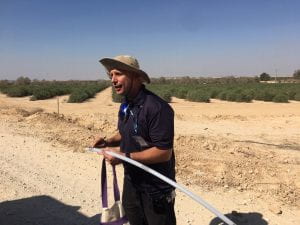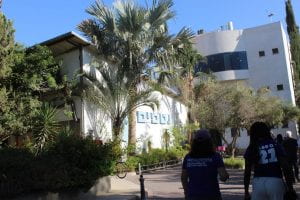Revolutionizing Sustainable Agriculture
by Morgan Gass and Helena Freire Haddad

Trekkers travelled to the Jojoba Hatzrim plantation to learn about sustainble agriculture and drip irrigation
For the second half of our first whole day in Israel, we headed just east of Be’er Sheva to visit the Kibbutz Hatzerim. The focus was on sustainable agriculture practices, and we visited the Jojoba Hatzrim plantation as well as the global drip irrigation company Netafim.
When we first drove into the kibbutz, our guide, Lior Mark, welcomed us to the vast and green jojoba plantation of Jojoba Hatzerim, contrasting to the dry desert climate that surrounds it. Over time, Hatzerim has adapted the crops and growing techniques to allow plants to thrive in a harsh environment. Now, Hatzerim is the world’s largest producer of the nutrient-dense oil coveted by cosmetic companies such as Estee Lauder and Loreal.
We learned that this large-scale production, in an arid region that only receives few millimeters of rainfall every year, was made possible by innovative water management and technologies developed by the kibbutz’s own company, Netafim. Back in 1965, the company developed the agricultural technique “drip irrigation” that enables growing crops with minimal water use and waste. Tubes beneath the crops drip water directly onto the roots of the plants using their patented dripper technology, a small plastic mechanism inside the tubing that administers the water. This technique decreases evaporation waste and water overuse by not having water sprayed into the air or flooding fields that use more water than optimal and are prone to evaporative waste.
This process was completely new to us, and we were shocked to learn that it has been implemented in over 110 countries, with over 150 billion dripper mechanisms sold. The technology rose from the critical water demand Israel faced at the time to enable the country to grow crops in the high temperature and dry conditions that make up most of its landmass.
In the tour, Mark expressed that the companies philosophy is that global water crises are inevitable due to water mismanagement, overuse in agriculture, explosive population growth, and global climates changing, and their technique of growing crops will be a necessity in a future where more countries are faced to address a need to grow their crops with less water.
We then went on a tour into the facilities that make the tubing and dripper mechanisms for both Israel and their international clients. This highly automated process showed the high specificity and development that their product has undertaken. We met with the lead Research and Development engineer of the company, and he explained the meticulous and individualized approach they take to each new farm that purchases their technology, such as researching the crop, climate, and other facts, and even going to the farm to take soil samples to ensure the best variation of their dripper is employed for optimal yields and longevity. Netafim is a company that revolutionized large-scale agriculture, and they make sure to aid in those using their technology to reap the full benefits of the advancement.
Brief Introduction about Netafim:
Netafim is a global leader in irrigation solutions for sustainable agriculture. Founded in 1965 by farmers for farmers, Netafim developed the world’s first drippers, creating a paradigm shift toward precision agriculture. Since then, Netafim has introduced breakthrough drip lines that irrigate fields with challenging topographies and groundbreaking fertigation systems that have reshaped precision irrigation to grow more with less. In 2003, the company went digital with its automated fertigation system and crop management software to help growers improve the quality of their produce. We continue to revolutionize irrigation in more than 110 countries through a worldwide network of 29 subsidiaries and 17 manufacturing plants – enabling farmers to grow more with less. Please visit Netafim’s website to know more: https://www.netafim.com/en/



